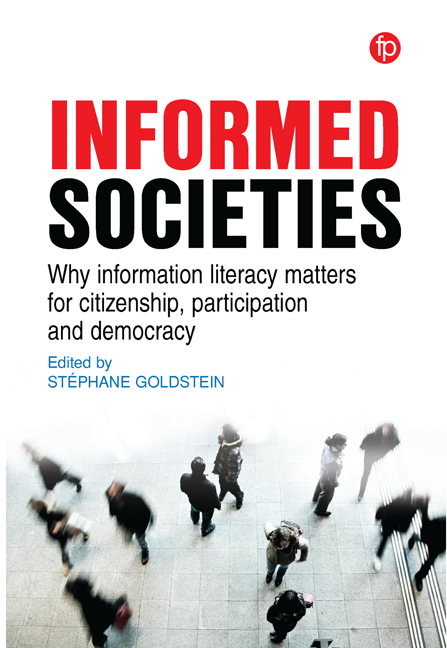Book contents
- Frontmatter
- Contents
- Figures and Tables
- Notes on the authors
- Foreword
- Introduction
- 1 Information Literacy in the Digital Age: Why Critical Digital Literacy Matters for Democracy
- 2 The Discourses of Power, Information and Literacy
- 3 What Intellectual Empathy Can Offer Information Literacy Education
- 4 The ‘Post-Truth’ World, Misinformation, and Information Literacy: a Perspective From Cognitive Science
- 5 Media and Information Literacy: Intersection and Evolution, a Brief History
- 6 Information Literacy and National Policy Making
- 7 Information Literacy as a Growth Pillar for a Fledgling Democracy
- 8 Information literacy and the Societal Imperative of Information Discernment
- 9 Libraries and Democracy: Complementarity in a Regime of Truth
- 10 Scottish Public Libraries Welcome Syrian New Scots: a Transition from Being a Refugee to Becoming an Active Part of the Community
- 11 Information Literacy, Lifelong Learning and the Needs of an Ageing Population
- Index
Foreword
Published online by Cambridge University Press: 22 February 2020
- Frontmatter
- Contents
- Figures and Tables
- Notes on the authors
- Foreword
- Introduction
- 1 Information Literacy in the Digital Age: Why Critical Digital Literacy Matters for Democracy
- 2 The Discourses of Power, Information and Literacy
- 3 What Intellectual Empathy Can Offer Information Literacy Education
- 4 The ‘Post-Truth’ World, Misinformation, and Information Literacy: a Perspective From Cognitive Science
- 5 Media and Information Literacy: Intersection and Evolution, a Brief History
- 6 Information Literacy and National Policy Making
- 7 Information Literacy as a Growth Pillar for a Fledgling Democracy
- 8 Information literacy and the Societal Imperative of Information Discernment
- 9 Libraries and Democracy: Complementarity in a Regime of Truth
- 10 Scottish Public Libraries Welcome Syrian New Scots: a Transition from Being a Refugee to Becoming an Active Part of the Community
- 11 Information Literacy, Lifelong Learning and the Needs of an Ageing Population
- Index
Summary
To say that this book is timely is an understatement.
Whether one is at the moment reflecting on Brexit, considering elections in Brazil or the USA, tracking developments related to academic freedom in Hungary, monitoring the development of censored search engines in China, to name but a few cases, one cannot but consider how information, information literacy (or lack thereof), and information technology has and continues to shape these social and political developments.
As those who study and teach information literacy, we are confronted with the dual reality that our work is urgently needed and that our past practices may not be sufficient for the kinds of challenges we are currently facing. The authors in this book have provided us with the gift of the opportunity to see our work through various lenses in order to confront the demands of contemporary global society and the context that networked technology has created for global civic engagement.
From my vantage point as the current Chair of the Information Literacy Section of the International Federation for Library Association and Institutions (IFLA), I am keenly aware of the importance of information literacy for all peoples. Information literacy enables people and communities to identify issues, make decisions, solve problems, and pursue future visions in all aspects of life. As the 2011 IFLA Media and Information Literacy Recommendations states:
Media and Information Literacy is a basic human right in an increasingly digital, interdependent, and global world, and promotes greater social inclusion. It can bridge the gap between the information rich and the information poor… Media and Information Literacy is closely related to Lifelong Learning. Lifelong Learning enables individuals, communities, and nations to attain their goals and to take advantage of emerging opportunities in the evolving global environment for the shared benefit of all individuals, not just a few.
This inspiring statement of the pursuit of equity and collective good continues on:
We urge governments and intergovernmental organizations as well as private institutions and organizations to pursue policies and programs that advocate for and promote Media and Information Literacy and Lifelong Learning for all. In so doing, they will provide the vital foundation for fulfilling the goals of the United Nations Millennium Declaration and the World Summit on the Information Society.
- Type
- Chapter
- Information
- Informed SocietiesWhy information literacy matters for citizenship, participation and democracy, pp. xix - xxiiPublisher: FacetPrint publication year: 2019



